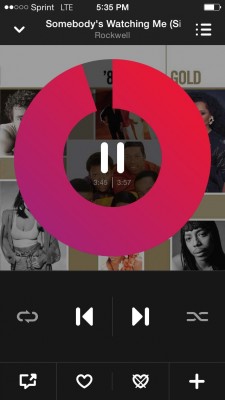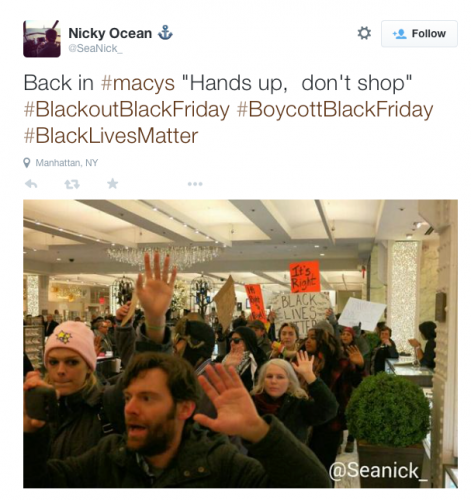This post is co-authored with Justin D Burton.
File under “not at all surprising”: we are pretty sure Beats Music is sniffing users’ Gmail and feeding that info into their “Just For You” recommendations. A few weeks ago I (Robin) mentioned to Justin that I thought this was happening to me, and then he discovered that it’s likely happened to him, too.
Justin: I found a most welcome message in my inbox a few days ago. I teach popular music at Rider University, and a friend who knows 1). winter break is hyper-writing time and 2). I’m always on the lookout for writing and thinking music (you know, a friend) was recommending a recent Hot Since 82 mix I might try. I wrote back to coolly express my gratitude (“OMG! Thanks so much for this!!!”), made a mental note to download it when I was back from traveling, and went back to thinking of snarky things to say about year-end music lists. A few days later, as I scrolled through my Beats “Just For You” section, hoping to find the perfect soundtrack for my morning coffee (*not* The-Dream), there was Hot Since 82’s 2014 album, Knee Deep in Sound. I’ve only been using Beats for a couple of months, so my “Just For You” list is culled from my listening habits in recent weeks (mostly Nicki Minaj, Azealia Banks, and Rihanna…okay, fine, also Drake) and music I may or may not much like but play in the classroom to critique with my students (this is how The-Dream and most of my rock recommendations find their way to being “just for me”). In other words, I’m very interested in Hot Since 82, but it’s not likely Beats would know that yet. Unless, of course, Beats had peeped my email. I like that Hot Since 82 is part of my profile now–Data Claus stuffed some much-appreciated variety in my JFY stocking. But I have this feeling that maybe Beats reading my Gmail isn’t always going to work out so well…
Robin: I made the mistake of hate-watching an episode of Dave Grohl’s HBO series “Foo Fighters: Sonic Highways,” and then I made the further mistake of emailing someone about how awful it was, the Rock Dads and the nationalism and the interview with President Obama, like he was a musicology Ph.D. not a J.D. I mentioned Dave Grohl by name in the email, and then within a few days, the Foo Fighters–who I have never listened to on Beats (nor have I listened to Nirvana…L7 or Ministry are about as close as I get)–were all over my “Just For You” recommendations. It felt almost like the algorithmic version of the U2 album appearing in my iTunes: here is some music that I really, really don’t want in my digital space, crowding up my music feed. (I mean, it’s probably not coincidental that Apple is behind both the U2 album and Beats.) It also felt a bit like a Rickroll: I was surprised with unwanted music where I least expected it to show up. (In retrospect, the old internet meme of Rickrolling seems like it foreshadows late 2014’s series of unwanted media objects dropped in users’ feeds or libraries.) More importantly, Beats’ recommendation algorithm seems to be weighing my emails more heavily than my actual behavior in the app itself (my favoriting, my searches, what I actually listen to)–but I’d need to know more about it before saying anything more definitive.










 Nathan- I started Cyborgology four years ago with PJ Rey, and today we’re handing it to long-time Cyborgologists David Banks and Jenny Davis. I’m very excited for the future of the blog and happy to reflect on the past year. Again, the blog has been a central part of the Theorizing the Web conference, and #TtW14 was my favorite yet. We saw the inclusion of Robin James whose brilliant work has made the blog even more fun to read. The one post of my own from the past year I’d like to highlight was a short reaction to a news story about Facebook throwing a sociology conference. Akin to what I’ve seen firsthand in academic department meetings and conferences as well as in governmental and corporate research groups, so-called “big” data swiftly passes right by basic methodological and ethical issues because the N is sooo biiiig. A sociology graduate student was quoted discussing how neutral Facebook is as a research environment and I responded with
Nathan- I started Cyborgology four years ago with PJ Rey, and today we’re handing it to long-time Cyborgologists David Banks and Jenny Davis. I’m very excited for the future of the blog and happy to reflect on the past year. Again, the blog has been a central part of the Theorizing the Web conference, and #TtW14 was my favorite yet. We saw the inclusion of Robin James whose brilliant work has made the blog even more fun to read. The one post of my own from the past year I’d like to highlight was a short reaction to a news story about Facebook throwing a sociology conference. Akin to what I’ve seen firsthand in academic department meetings and conferences as well as in governmental and corporate research groups, so-called “big” data swiftly passes right by basic methodological and ethical issues because the N is sooo biiiig. A sociology graduate student was quoted discussing how neutral Facebook is as a research environment and I responded with  PJ- It’s hard to believe that over four years have passed since Nathan and I sat in our neighborhood bar in DC, spitballing silly names for a technology and society blog. It seems impossible to have imagined where this idea was headed and how profoundly it would shape our experience as a grad students. Cyborgology allowed us to start communicating with a wide range people who were excited to discuss the same sorts of questions that we were asking about technology and society, even as our own department proved unreceptive. I quickly realized that many of the most profound insights on these issues were not coming from the conventional academic sources that grad students are taught to rely on (though journal articles and conferences certainly have their place). Most important, Cyborgology has connected me to my fellow Cyborgologists, who have been an invaluable source of support, information, and ideas. I consider myself incredibly fortunate for this. I wish Jenny and David luck as they step into their new roles as our chief editors. I expect Cyborgology’s fifth year to be its best yet!
PJ- It’s hard to believe that over four years have passed since Nathan and I sat in our neighborhood bar in DC, spitballing silly names for a technology and society blog. It seems impossible to have imagined where this idea was headed and how profoundly it would shape our experience as a grad students. Cyborgology allowed us to start communicating with a wide range people who were excited to discuss the same sorts of questions that we were asking about technology and society, even as our own department proved unreceptive. I quickly realized that many of the most profound insights on these issues were not coming from the conventional academic sources that grad students are taught to rely on (though journal articles and conferences certainly have their place). Most important, Cyborgology has connected me to my fellow Cyborgologists, who have been an invaluable source of support, information, and ideas. I consider myself incredibly fortunate for this. I wish Jenny and David luck as they step into their new roles as our chief editors. I expect Cyborgology’s fifth year to be its best yet! Jenny- I’m feeling pretty lucky that I got to spend another year blogging alongside, and exchanging gif-laden emails with, such a fantastic group of writers. Through the years, I’ve found that my favorite posts are the ones I never meant to write, but felt I had to write. This year, I wrote one such post,
Jenny- I’m feeling pretty lucky that I got to spend another year blogging alongside, and exchanging gif-laden emails with, such a fantastic group of writers. Through the years, I’ve found that my favorite posts are the ones I never meant to write, but felt I had to write. This year, I wrote one such post,  David- This last year was a blast! I had a great time writing
David- This last year was a blast! I had a great time writing  Sarah- This last year has been marked by a great deal of transition and reexamination – with my career, with where I live, with what I do and what I want and what truly matters to me. I think my writing here has been a reflection of that, and part of the process for me has been learning to be comfortable with letting more and more of it show – or at least learning to be comfortable with the discomfort. Probably one of the posts that stands out the most to me is “
Sarah- This last year has been marked by a great deal of transition and reexamination – with my career, with where I live, with what I do and what I want and what truly matters to me. I think my writing here has been a reflection of that, and part of the process for me has been learning to be comfortable with letting more and more of it show – or at least learning to be comfortable with the discomfort. Probably one of the posts that stands out the most to me is “ Robin- Two of my most successful posts this year were
Robin- Two of my most successful posts this year were 

